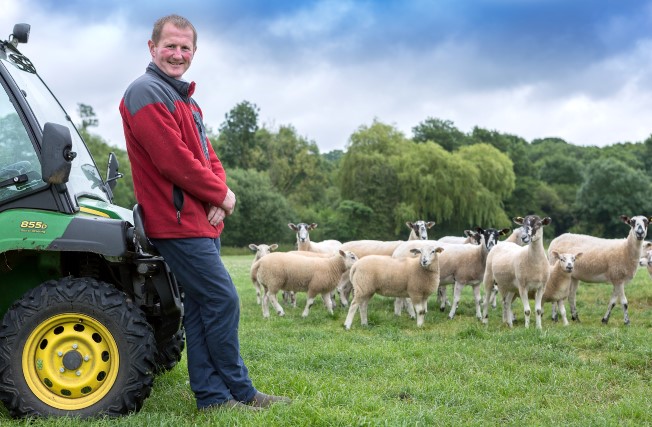Reducing antibiotic use with Challenge Sheep
Wednesday, 13 June 2018
Farming at Brookhouse Farm in Worcestershire, Challenge Sheep farmer Sam Jones has taken a massive step forward in reducing the antibiotic use on farm when protecting his flock against abortion and infection at lambing this year.

“In the past we’ve preventatively administered Oxytet to the whole flock 10 days before lambing. However, it wasn’t until I’d had discussions as part of the Challenge Sheep project and with our vet that I realised how detrimental this could be to our flock,” explained Sam.
Enzootic abortion of ewes (EAE) is caused by the bacteria Chlamydia abortus and is responsible for 52 per cent of sheep abortions in the UK. To treat flocks at the time of an outbreak, an injection with a long-acting oxytetracycline (Oxytet) is used on all sheep to reduce the risk of further abortion during that lambing period. This should only be administered once tests confirm the diagnosis, but many farmers treat ahead of results. By doing so, the ‘just-in-case’ approach has added to the overuse of antibiotics in the sheep industry.
“This year, after a long conversation with my vet, we made the decision two weeks before lambing not to inject,” Sam said.
In the past, Sam has also injected all lambs with 0.5ml of penicillin as a precaution against infections but has put steps in place this year to stop this practice. The use of iodine on all lambs, three times in the first two hours of life, has taken the place of the injection. He has also started dipping tags in surgical spirit to reduce infection in the ears that may lead to joint ill.
“We found out about using surgical spirit at a Challenge Sheep discussion meeting and it’s been really effective as well as very simple. Joint ill was something I hated to see and since we’ve been tagging at birth it was on the rise. We’ve only had three cases this year and I think two of those were caused by infections from tags that hadn’t been dipped.”
Following the success of the changes in practice this lambing season, Sam will be continuing to reduce use of antibiotics in the future by vaccinating all ewes that are bought in.
“We’ve managed to make a cost saving of £1,313 this year from reducing antibiotic use, but, more importantly, the biggest benefit is we’ve taken steps towards reducing the risk of resistance developing.
“I didn’t know how bad blanket use of antibiotics was until it was explained to me. We did it because it’s something we’ve always done, but that’s not a justification anymore. Antibiotic resistance is a real threat to all and needs to be taken seriously,” added Sam.
Commenting on Sam’s success, veterinary surgeon and Challenge Sheep facilitator, Phillipa Page said: “This is a great example of how investigating and changing practices on farm that have ‘always been done like that’ can lead to cost-effective, more responsible use of medicines and make improvements to sheep health. Working with his vet and participating in Challenge Sheep has given Sam the confidence and knowledge to make the changes.
With disease challenges such as those causing abortion, the use of vaccination is recommended as a preventative measure. While it may initially be more expensive, vaccination offers protection from abortion for more than one lambing season and reduces the chance of abortions in already infected ewes. It is now the perfect time to look at how you use antibiotics on farm and, if not already, start discussions with your vet to develop cost-effective good practice protocols.”

